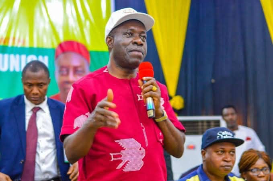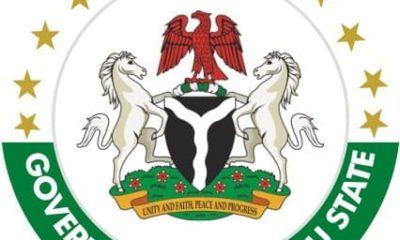
News
Nigerian int’l travellers to pay extra $11.5 charge per ticket from Dec. 1

• New charge raises Nigeria’s security levy to $31.5 per ticket
• NCAA to earn additional $46 million yearly
• Nigerian travellers pay 264% more taxes than other African countries, says IATA
• Experts query multiple taxes, cumulative $150 per international ticket
• More travellers will jettison Nigerian airports, say analysts
Nigeria’s inbound and outbound passengers are in for an additional tax regime, with a $11.5 security levy effective December 1, 2025. This new tax, also known as the Advance Passenger Information System (APIS), increases Nigeria’s security levy to $31.50 per flight ticket and is estimated to generate a cumulative sum of $46 million for the Nigeria Civil Aviation Authority (NCAA) yearly.
On the other hand, the development will further increase the cost of international travel borne by Nigerian travellers. The apex regulatory body, NCAA, in a notice to airlines, stated that the levy aimed to create a “single window” approach for all agencies at the airport, and the collection is expected to last for 20 years.
According to the agency, the system would help to track passenger movements, improve border control, and provide airlines with a cost-recovery mechanism for the system’s maintenance.
The regulatory agency also stated that the $11.5 levy would streamline passenger clearance at Nigerian airports by collecting and processing passenger data before arrival. This initiative is in partnership with the Nigeria Immigration Service (NIS).
According to the NCAA’s memo to the airlines: “The APIS charge will be collected as a point of sale and will be levied on all tickets issued from December 1, 2025, for each passenger departing from or arriving in Nigeria. The lifting airline is responsible for remitting the APIS charge to the NCAA.
“Therefore, all airlines (including Nigerian carriers) operating international flights into and out of Nigeria are required to take immediate steps to update ticketing and reservation systems to reflect the new APIS charge, as invoicing for the charge will commence from 1st December 2025 for tickets issued to passengers from 01DEC2025 for travel to and from Nigeria.”

Capt. Chris Najomo-led NCAA insists that the levy aligns with international best practices and the International Civil Aviation Organisation (ICAO) standards.
However, the levy is different from the extant $20 security levy introduced in 2010 by the former Director-General of NCAA, Dr Harold Demuren, in the wake of the Umar Abdulmutallab suicide bomber crisis of December 25, 2009, which was expected to last for 20 years.
The $20 levy was also intended to enhance security infrastructure at Nigerian airports and implement advanced passenger information systems, though industry experts noted that there has been no appreciable improvement in infrastructure 15 years later.
Notably, the regulatory authority exempted infants, diplomats, airline crew on duty, transit/transfer passengers within 24 hours and involuntary re-routing due to technical problems or weather conditions, from the new levy. Information gathered indicated that the exempted class of passengers constitutes about 10 per cent of the total travelling public.
Checks by The Guardian indicated that an average inward or outbound passenger in Nigeria will now pay about $150 as either taxes, charges or levies.
For instance, each inbound and outward passenger currently pays $20 and five per cent as security and Ticket Sales Charge (TSC), respectively, to NCAA, while FAAN receives $100 as Passenger Service Charge (PSC).
The additional levy, however, is creating confusion in the sector as experts wonder if it is different from the current $20 security levy collected by the same NCAA.
The NCAA, on behalf of four other agencies, collects the five per cent TSC and Cargo Sales Charge (CSC) from both domestic and international passengers.
The TSC/CSC is shared among parastatals as follows: NCAA, 56 per cent; the Nigerian Airspace Management Agency (NAMA), 22 per cent; Nigerian Meteorological Agency (NIMET), nine per cent; Nigerian College of Aviation Technology (NCAT), seven per cent, and the Nigerian Safety Investigation Bureau (NSIB), with six per cent.
Apart from these, international passengers departing or arriving in Nigeria are required to pay the sum of $80 and $100 as PSC to FAAN for citizens of the Economic Community of West African States (ECOWAS) and other African and non-African citizens, respectively.
The PSC sum, FAAN said, is also for airport operations (maintenance and upgrades of airport facilities, security (screening of passengers and baggage), safety (emergency response services and equipment and comfort (provision of amenities and services for passengers).
Indigenous and foreign airlines pay a five per cent fuel surcharge to FAAN for every litre of fuel purchased in the country. Additionally, foreign airlines pay unspecified over-flying charges, terminal navigation charges, and extended hours service to NAMA.
Related News
NCAA tasked to regulate drone operations in Nigeria
NCAA warns airlines against non-compliance with financial obligations
Aviation experts kick as Kalu accuses pilots of smoking marijuana
According to IATA, Nigerian air travellers pay an average of $180 per foreign departure and arrival, which is about 264 per cent higher than any other African country.
IATA also said that charges and levies in Nigeria were among the world’s most expensive, yet without any significant value to show for it. Data obtained from IATA indicated that at least 90 countries require airlines to submit Advance Passenger Information (API) before a flight’s arrival.
Airlines are responsible for collecting this data from passengers during the check-in process and transmitting it to the border control authorities of the destination country.
Some of the countries are the United States of America (USA), Canada, Mexico, the United Kingdom, France, Germany, Spain, Italy, the Netherlands, Ireland, Switzerland, Austria, South Korea, Taiwan, India, Thailand, Indonesia, Jamaica, Antigua and Barbuda, Barbados, Bermuda, Brazil, and Costa Rica.
However, most of the aforementioned countries, particularly in Europe and the Americas, do not charge passengers or airlines an additional fee for providing this information before departure or arrival. In fact, it is part of the required standards expected from the airlines.
With the 2024 Executive Summary on International and Domestic Flight Operations, obtained from the NCAA, which recorded a total of 4,135,830 passengers as inbound and outbound, the regulatory agency is projected to earn about $46 million (about N69 billion) from the new levy in one year.
However, since the levy excludes certain segments of passengers, such as infants, diplomats, airline crew on duty, transit/transfer passengers within 24 hours, and involuntary re-routing due to technical problems or weather conditions, the revenue expected to be generated from this source alone by the regulatory body may be slightly lower.
Aviation industry analyst Chris Amokwu stated that the various charges or levies imposed on airlines and the travelling public were harming the country’s air business, while also leading to a hike in airfares both within and outside the country.
Amokwu explained that Nigeria had the privilege and opportunity to rule African aviation but lacked the strategy to do so. He regretted that the government and its agencies still view aviation as elitist, rather than an economic driver, a reason he said the government imposed various levies on air travel, contradicting the International Civil Aviation Organisation’s (ICAO) practices and recommendations against making the sector profit-oriented.
Also, one of the staff of foreign airlines operating on the Nigerian routes said that once the new levy comes on board, it would lead to an additional burden on airlines and passengers.
The airline source regretted that the same passengers who would be slammed with an additional $11.5 levy were already struggling with the naira devaluation. He added that the current sordid economic situation had driven away air travellers from the sector, while the majority of them patronise the road sector.
He said: “Do you know that a lot of Nigerians go by road to neighbouring countries in West Africa to join flights to the world? Before now, they went by flight to these countries. Now, economic reality has forced them onto the streets. Visit Agege, Jibowu, and Maza Maza to see the number of vehicles departing for our neighbouring nations. It is a critical issue today and can only worsen with additional charges.
“APIS is a national security programme. Why are we passing it to the passengers? How did we get to the value of $11.5 per passenger? This is more like an App. Why the high cost? Nigeria needs to encourage more people to fly. We have the population.
“Many countries do not charge the APIS fee. Those that do. It is almost negligible. Like five dirhams in the UAE. The UK does not charge. The U.S. does not charge. You can check them out.”
Also, an aviation security expert, Group Captain John Ojikutu (rtd), questioned the essence of the levy. Ojikutu expressed that the NCAA was already charging passengers through airlines the sum of $20 as a security levy, while an additional five per cent TSC/CSC is also warehoused by the same NCAA on behalf of the other four agencies.
Ojikutu described the proposed levy as multiple taxation on the travelling public, but said the new charge would only be acceptable to the public if the agency planned to abolish the current $20 fee for the same security purpose.
When contacted, the Director, Public Affairs and Consumer Protection, NCAA, Michael Achimugu, promised to get across to the reporter “next week. I don’t want to give you half-baked information.”
Also, when contacted, the Area Manager, West and Central Africa, IATA, Dr Samson Fatokun, did not respond. However, the global airline association has, over the years, criticised high taxes and levies imposed by Nigeria, describing them as “the highest in Africa.”
The Vice President of IATA, Africa and Middle East, Kamil Al Alwadhi, stated in a recent meeting in Abuja, Nigeria, that research shows Nigeria ranks highest in airport charges in Africa, with Abuja Airport becoming the most expensive airport on the continent, followed closely by Lagos Airport. According to him, there are about 27 charges imposed on airlines by the Nigerian government. (The Guardian)
News
Enugu tops BudgIT’s 2025 ‘State of States’ Ranking as Nigeria’s Most Financially Independent subnational

…Beats Lagos, Abia, Anambra, Kwara; emerges likeliest to survive without FAAC Allocations
Enugu State has emerged as Nigeria’s most fiscally viable subnational government, according to BudgIT’s 2025 State of States ranking.
The report shows that Enugu State is the most probable state to finance its operating expenses exclusively from internally generated revenue (IGR) and independent of allocations from the Federation Account Allocation Committee (FAAC).
However, whereas Enugu, Lagos, Abia, Anambra, and Kwara are the five top states likeliest to survive independent of FAAC receipts, Yobe, Benue, Jigawa, Kogi, and Imo are ranked as the least viable states presently, the report also shows.
The findings are based on Index A, which measures states’ ability to meet recurrent expenditure obligations using only IGR. The research methodology for Index A was the ratio of operating expenses to the state’s IGR. According to BudgIT, states that rank higher on this index exhibit greater financial autonomy and long-term viability.
“States that perform strongly on Index A have comparatively limited dependence on FAAC allocations and thus possess greater viability if they were to theoretically exist as independent entities,” the report stated.
The rankings show that Enugu State scored 0.68, implying that 68 percent of the state’s IGR would have catered to its operating expenses. The scores of the remaining four of the top five states are Lagos State (0.83), Abia State (1.56), Anambra (1.66), and Kwara (1.73).

In 2024, Rivers, Lagos, Ogun, Anambra, and Cross River made the top five rankings, thus the 2025 report represents for Enugu State a quantum leap in improved revenue collection and expenditure management and a major score for the Governor Peter Mbah-led administration.
Although Mbah met the state’s IGR at N30bn in May 2023, he ramped it up to N37bn by the close of the year and scaled it up to N180.05bn in 2024 by introducing technology, including e-payment, to plug leakages and sharp practices in revenue, as well as by widening the tax net to reduce tax and revenue evasion.
Meanwhile, whereas Enugu and Lagos lead in IGR ranking, fewer states meet the 50% threshold, as BudgIT’s 2025 State of States report shows that the number of states generating enough revenue to cover their operating expenses has reduced compared to 2024.
In 2024, Rivers (121.26 percent) and Lagos (118.39 percent) were the only two subnationals that generated more than enough IGR to cover their recurrent expenditure. Rivers is visibly missing in the 2025 analysis.
Thus, in 2025, this coveted group now includes Lagos (120.87 percent) and Enugu (146.68 percent), with Enugu taking the number one spot.
According to BudgIT, 28 states still depend significantly on federal transfers and other external inflows to fund their operations.
On Index A1, which measures IGR growth, Enugu again leads the ranking, followed by Bayelsa, Abia, Osun, and Kano. These states recorded the strongest momentum in boosting internally generated revenues during the 2024 fiscal year.
At the bottom, Kebbi and Yobe recorded negative IGR growth, while Ebonyi, Bauchi, and Benue also posted weak performances. This represents a notable improvement from 2023, when seven states recorded negative growth.
“While it may be too early to celebrate, as the uptick could partly reflect increased inflows from federation transfers, it is a much better performance than the previous year,” BudgIT noted.
News
Kidnappers abduct 10 passengers in Edo, demand ₦20million ransom

Acivic tech accountability group, MonITNG, has raised the alarm over the worsening wave of kidnappings along Edo highways, calling on Governor Monday Okpebholo and security agencies to urgently intervene.
The organisation made the call in a post shared on X (formerly Twitter), titled “KIDNAPPING ALERT IN EDO STATE!”
MonITNG expressed deep concern over what it described as “the growing wave of insecurity in Edo State, as families are thrown into pain and fear.”
According to the post, “Two individuals, Mr. John Odion from Ogute-Emai, Owan East LGA, and Miss Ayeni Joy, are among the victims of the kidnapping incident that occurred on Saturday, October 25, 2025, around the NIFOR area near Aso-Rock Police Checkpoint, along the Benin–Sobe–Akure Road.”
The platform disclosed that about ten passengers travelling from Sabo-Gidda Ora in Owan West Local Government Area to Benin City were abducted by gunmen, while “the driver and two breastfeeding mothers were released.”
Providing further details, MonITNG stated that “Mr. Odion, who could not find a vehicle from Afuze to Benin, took a bike to Sabo and joined the ill-fated journey where he was kidnapped alongside others.”

It added that “the kidnappers initially demanded ₦20 million ransom, but negotiations are ongoing and they are now asking for ₦10 million for his release.”
The group also reported that “Miss Ayeni Joy was kidnapped around the same location while returning from Afuze,” noting that the abductors had demanded “₦20 million ransom for her freedom.”
The civic tech group said these incidents “have once again exposed the frightening state of insecurity on Edo highways, where innocent citizens live in fear of abduction.”
MonITNG appealed to the Edo State government, the Nigerian Police Force, the Nigerian Army, and local vigilante groups to “act swiftly and decisively to secure the release of these victims and restore safety along the Benin–Sobe–Akure corridor.”
It warned that the situation demanded “urgent intervention and visible security presence to prevent further abductions.”
Ending its post with a passionate appeal, the group declared: “This is a call for justice, action, and humanity. Edo State must not become a haven for kidnappers. The lives of our brothers and sisters matter. The government and security agencies must rise to their duty, protect lives, rescue victims, and restore peace.”
The post was accompanied by hashtags and mentions directed at state and national security authorities, including #EdoInsecurity, #SecureEdo, #EndKidnapping, @PoliceNG, @EdoPoliceNG, @HQNigerianArmy, and others.
This development is coming just days after Wahab Aisha, who was kidnapped two weeks ago at Igbira Camp in Auchi, Edo State, regained her freedom.
Aisha’s release was confirmed on Saturday by an activist, Harrison Gwamnishu, who expressed both relief and frustration over what he described as the government’s failure to collaborate in the rescue mission.
“Thankfully, she regained her freedom last night. Sadly, we couldn’t move in to capture her abductors because the State security agencies and the Edo State government have repeatedly failed to respond to our calls for collaboration.”
According to him, Aisha was kidnapped at Igbira Camp in Auchi and released in Okpella, Edo State — two distant communities in Etsako West Local Government Area.
He revealed that the victim was forced to trek a long distance with her abductors before her eventual release.
🚨KIDNAPPING ALERT IN EDO STATE!
Dear Governor @m_akpakomiza
We are deeply troubled by the growing wave of insecurity in Edo State, as families are thrown into pain and fear. Two individuals, Mr. John Odion from Ogute-Emai, Owan East LGA, and Miss Ayeni Joy, are among the… pic.twitter.com/fO2VMombga
— MonITNG (@monitng) October 28, 2025
News
Police repel gunmen attack in Ezinifite, neutralize suspect, recover firearm

The Anambra State Police Command has confirmed the successful repelling of an attempted armed attack on Ezinifite Community in Nnewi South Local Government Area in the early hours of Monday, October 27, 2025.
According to a statement issued by Police Public Relations Officer SP Tochukwu Ikenga, the swift intervention of a combined security team comprising Police operatives and members of the Agunechamba Vigilante group thwarted the assault. The joint team engaged the attackers in a gun battle, resulting in the death of one suspect. The remaining assailants reportedly fled into nearby bushes with suspected gunshot wounds.
Security operatives recovered a pump-action firearm and the body of the neutralized suspect at the scene. Intelligence and offensive operations are currently underway to locate and apprehend the fleeing individuals.
Commissioner of Police CP Ikioye Orutugu commended the bravery and vigilance of the local security forces. He reassured residents of the Command’s unwavering commitment to community safety, particularly as the November 8 governorship election approaches.
-

 News3 days ago
News3 days agoNew Service Chiefs: Over 90 Army, Navy, Air Force senior officers to retire
-

 News3 days ago
News3 days agoAnambra Election: Controversy trails Soludo’s cash-for-votes pledge
-

 News11 hours ago
News11 hours agoJUST IN: Police ban Agunechemba, other vigilantes from functioning during Anambra election
-

 News2 days ago
News2 days agoNDLEA arrest Pretty Mike, 100 others at Lagos Club
-

 News1 day ago
News1 day agoTinubu meets newly appointed service chiefs
-

 News2 days ago
News2 days agoHerbalist hides in fridge as police raid shrine, recover two corpses in Delta
-

 News2 days ago
News2 days agoBREAKING: Hospitals to shut down as Nigerian doctors embark on nationwide strike October 31
-

 News2 days ago
News2 days agoEnugu Govt sets December 31 Deadline for ongoing 105 Layouts for Revalidation, Digitization Drive (FULL LIST)



























